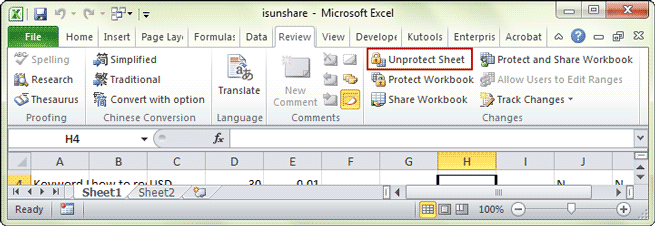Unprotect Excel Sheets Without Password Using ZIP Method

Discovering how to unprotect Excel sheets without a password using the ZIP method can be a lifesaver, especially when you're faced with a locked spreadsheet. While Microsoft Excel provides robust security features for protecting sensitive data, there are legitimate scenarios where you might need to bypass these protections legally. This guide will walk you through the ZIP method to unlock your Excel sheets, along with tips to ensure you're not infringing on any privacy or security guidelines.
Understanding Excel Protections

Before we delve into the ZIP method, it’s crucial to understand what protections are in place in Excel:
- Workbook Protection: Prevents unauthorized changes to the entire workbook structure.
- Worksheet Protection: Locks specific worksheets to prevent edits or deletion.
- Cell Protection: Locks specific cells within a worksheet to prevent alteration or copying.
Here are some scenarios where unprotecting might be necessary:
- Forgotten or lost password.
- Inherited spreadsheet from previous employees.
- Need to update old documents locked by former users.
The ZIP Method for Unprotecting Excel Sheets

Excel files (.xlsx) are essentially ZIP files containing XML files. The ZIP method leverages this to circumvent sheet protections. Here's how you can unprotect Excel sheets using this technique:
Step 1: Rename and Extract

First, you need to rename the Excel file from .xlsx to .zip:
- Open File Explorer and navigate to your Excel file.
- Right-click on the file, choose ‘Rename’, and change the extension to .zip.
- Extract the ZIP file to a folder on your PC.
📝 Note: This method only works on Excel files saved in the .xlsx format. Files in the older .xls format do not support this technique.
Step 2: Modify the XML Files

Now, you’ll modify specific XML files to remove the protection:
- Navigate to the ‘xl’ folder inside the extracted files.
- Open the ‘worksheets’ subfolder.
- Locate the .xml files corresponding to your sheets (e.g., ‘sheet1.xml’).
- Open these files in a text editor like Notepad.
- Search for the line containing ‘protection’ and remove it.
- Save the changes to these XML files.
Step 3: Repackage the File

To repackage the modified Excel file:
- Close all XML files.
- Select all files and folders in the root directory of the extracted ZIP.
- Right-click and compress them back into a ZIP file.
- Rename this new ZIP file back to .xlsx.
Step 4: Verify the Changes

Open the now-unprotected Excel file to confirm the sheets are editable:
- Ensure you can make changes to the formerly protected sheets.
💡 Note: This method might work for basic protections but can fail for advanced or macro-level protections.
| Step | Action | Outcome |
|---|---|---|
| Rename | Change .xlsx to .zip | File can now be opened as a ZIP |
| Extract | Extract ZIP file contents | Files and folders are now accessible |
| Modify | Edit sheet.xml files | Protection settings are removed |
| Repackage | Compress files back to ZIP | Original file structure is maintained |
| Rename | Change .zip back to .xlsx | Excel file is now editable |

Unprotecting Excel sheets using the ZIP method is a practical solution for dealing with basic sheet protection issues. However, it's important to use this technique responsibly. Remember that Excel protection exists to safeguard data, so ensure you have the rights to unprotect the document before proceeding.
When employing this method:
- Verify ownership or have permission to access the data.
- Use the ZIP method sparingly and only when necessary.
- Avoid using it for unauthorized access.
📌 Note: Always back up your Excel file before attempting any modifications to prevent data loss.
Understanding the ZIP method not only helps you manage password-protected sheets but also deepens your knowledge of how Excel file structures work, providing insights into data security in general.
In summary, Excel's protection mechanisms are designed to secure data, but there are legitimate reasons to override these protections, like forgotten passwords or inherited files. The ZIP method offers a straightforward way to unprotect sheets, but it must be used judiciously. Make sure to obtain necessary permissions and back up your work before proceeding.
Is it legal to unprotect an Excel sheet without a password?

+
The legality depends on the context. If you own the file, have permission, or need access for legitimate reasons (like an inherited file from a former employee), it’s generally not illegal. However, unprotecting sheets without authorization from the owner can be considered a breach of privacy or copyright.
Will this method work on all versions of Excel?

+
The ZIP method works for Excel files saved in the .xlsx format, which is used by Excel 2007 and later versions. Older .xls formats won’t support this technique.
What if the ZIP method fails to unprotect the sheet?

+
If the ZIP method fails, the protection might be more advanced. Advanced or macro-level protections may require alternative methods or specialized software to unprotect.



